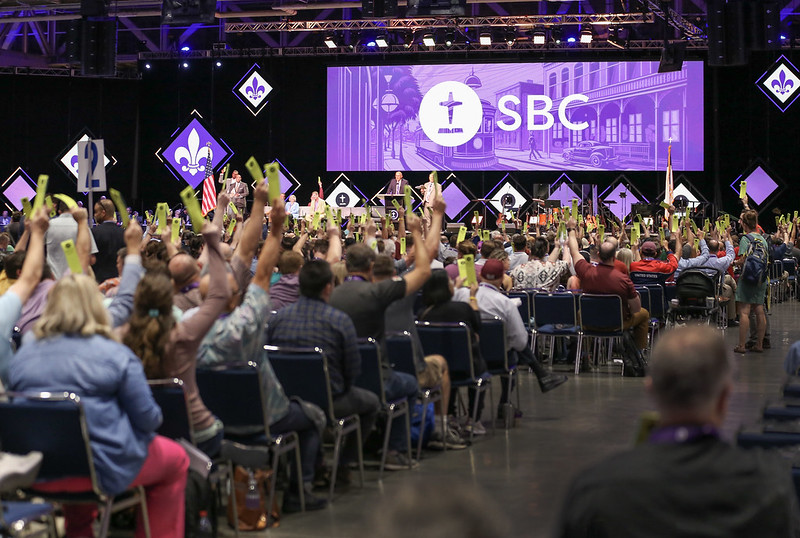
Vote Fails, Reform Hits Roadblocks
The Southern Baptist Convention (SBC) is “as complementarian as before” a vote to constitutionally ban female pastors failed, says new SBC president Clint Pressley. The vote, which narrowly missed approval, came earlier this week at the SBC’s 2024 annual meeting.
Pressley also expressed confidence that the task force on sexual abuse reform is moving the SBC forward. “I think you can be really confident as you’ve seen in the last couple of years that the Southern Baptist Convention takes sexual abuse terribly seriously….” he told delegates to the meeting. Yet, there are roadblocks.
“As Complementarian As Before”
In a news conference following the meeting Wednesday, Pressley argued that the SBC is “just as complementarian as before that vote ever came into play.”
Complementarianism is the belief that God gives men and women complementary roles in the home and church and only men may hold leadership positions.
“The constitutional amendment, which is known as the Law Amendment, was there to provide some clarity,” Pressley explained. “But it’s not necessary for our convention of churches to maintain a real sense of complementarianism…. We have not abandoned biblical truth.”
Sixty-one percent of delegates to the SBC annual meeting in Indianapolis voted in favor of the amendment. A two-thirds majority was needed. The decision is seen as a victory for local church autonomy.
An Unnecessary Vote?
Voting on another issue seemed to prove Pressley’s point about the constitutional amendment being unnecessary. The vote to oust First Baptist Church in Alexandria, VA, for having a female pastor on its staff passed with a 91 percent majority. The church’s female pastor holds the title “Pastor of Women and Children.”
The SBC has expelled several churches for ignoring the SBC’s unofficial ban on female pastors. Among them are the Saddleback Church in southern California and Fern Creek Baptist Church in Kentucky. Both churches were forced out in 2023 and unsuccessfully appealed the decisions.
Meanwhile, the Nashville Tennessean pointed out in an opinion piece that “Baptist women who feel God’s call to serve in ministry as missionaries or pastors have the opportunities to do so thanks to Cooperative Baptists, Texas Baptists, Virginia Baptists, American Baptists, Baptist Women in Ministry, thousands of moderate Baptist churches America, and the highest-ranked Baptist university in the world (Baylor).”
Meredith Stone, executive director of the nonprofit Baptist Women in Ministry, expressed her organization’s regret that the vote on amending SBC’s constitution even took place. “Women in ministry were used as props for the display of extreme conservatism in order to advance the power of a faction within the SBC,” she said.
USA Today noted that the narrow vote settled “a two-year political dispute about church policy, though it might not subdue the ensuing debate about women’s roles in the church.” The story added that passage of the amendment might have resulted in additional churches leaving the SBC.
“The proposed amendment was by far the most animating issue headed into this year’s SBC annual meeting, one that even colored other decision-making – including the election for SBC president,” the media outlet said.
The New SBC President
New SBC president Clint Pressley, pastor of Hickory Grove Baptist Church in Charlotte, NC, was one of six candidates for the SBC presidency this year.
Seminary pastor David Allen missed the first-round cutoff and three candidates – Tennessee pastor Jared Moore, Oklahoma pastor Mike Keahbone and North Carolina pastor Bruce Frank — were eliminated in the first round of voting. Pressley received 56 percent of the 7,562 votes, while Tennessee pastor Dan Spencer received 43.7 percent in the deciding vote.
Pressley is a conservative who promised to keep the organization on an even keel prior to his election. He noted that the rhetoric and temperature within the SBC are high and should “come down a good bit.”
He also said he wanted to do the following:
- Uphold the sufficiency of scripture, the power of the gospel and the need for evangelism
- Strengthen churches investing in pastors, especially young pastors
- Focus on the Great Commission, which directs Christians to spread the gospel, baptize new believers and teach obedience to Christ’s commands
Roadblocks to Sexual Abuse Reform
Delegates to the SBC annual meeting voted to affirm priorities recommended by the organization’s task force on sexual abuse reform, which are:
- Expansion of training materials
- Establishment of a website that lists abusers
- Creation of a “permanent home for abuse prevention and response”
But task force leaders say that problems such as lack of funding, insurance concerns and other unnamed issues have been roadblocks to progress.
“The process has been more difficult than we could have imagined. And in truth, we made less progress than we desired due to the myriad obstacles and challenges we encountered in the course of our work,” the task force reported.
New training materials to combat sex abuse were created, but the website to list and track abusers remains empty. And there is no “permanent home or funding” for abuse reforms once the volunteer task force completes its work this week.
One of the task force’s achievements was the creation of a nonprofit organization called the Abuse Response Committee to oversee the website. But the committee has been unable to publish abusers’ names because of objections from SBC leaders.
Task force leaders have said they raised $75,000 outside the SBC to vet the initial list of abusers, which included sexual offenders who have been found guilty in criminal court or have had a civil judgment against them. Yet, the database remains empty.
The SBC’s Ethics and Religious Liberty Commission recently designated $250,000 for abuse reform, and the SBC’s two mission boards have pledged nearly $4 million to help churches respond to abuse. However, leaders of both mission boards have said they will not help fund the Abuse Response Committee.
“SBC leaders have long sought to shield the denomination and especially the hundreds of millions of dollars given to Southern Baptist mission boards and other entities from liability for sexual abuse,” Christianity Today reported.
“The 12.9 million member denomination has no direct oversight of its churches or entities, which are governed by trustees, making it a billion-dollar institution that does not exist outside of a few days in June when the SBC annual meeting is in session,” the publication added.
“As a result, abuse reform has been left in the hands of volunteers such as those on the task force, who lacked the authority or the resources to complete their task,” Christianity Today concluded.
Opposing IVF
Southern Baptists also expressed their opposition to in vitro fertilization in a non-binding resolution that passed earlier this week. It calls for more government regulation of IVF and urges SBC members to seek IVF treatment to minimize the number of embryos created for them. The resolution fell short of demanding a ban on IVF.
“IVF involves combining eggs and sperm in a laboratory dish to create an embryo,” Reuters explained in a story posted yesterday. It noted that the SBC objects to IVF because the process “routinely creates more embryos than can be implanted and that leads to the destruction of hundreds of thousands of frozen embryos, which the church considers human life.”
According to Reuters, the SBC is “signaling (that) the campaign by evangelicals against abortion is widening to include the popular fertility treatment.”


